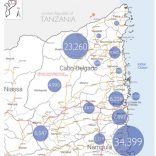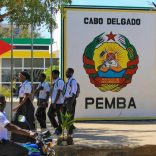Angola/Mozambique: Commit to eliminating cholera by 2030 - African Union
Mozambique: Amnesty calls for ‘official investigation’ into human rights abuses

Photo: Lusa
Amnesty International (AI) on Tuesday called for an official investigation to understand what has happened over the past three years in northern Mozambique and for the perpetrators of human rights abuses there to be held accountable.
“Until now, all the actors [Mozambican armed forces, insurgent groups and private security or paramilitary companies] have acted with total impunity, even before [the latest episodes in the town of Palma, in the far north of Cabo Delgado province, northern Mozambique, on 24 January],” Pedro Neto, executive director of AI in Portugal, told Lusa.
“We were on the ground suffering threats, journalists were arrested in Cabo Delgado because of denouncing the situation, the bishop himself, Luís Fernando Lisboa, who was the bishop of Pemba had to leave Pemba a few months ago, not of his own will, but because he was threatened with death numerous times, and so there was an attempt to cover up this whole situation,” he said.
AI released a report – “What I Saw Is Death: War Crimes in Mozambique’s ‘Forgotten Cape'” – which claims that hundreds of civilians have been killed in Mozambique by the armed jihadist group known locally as ‘Al-Shabaab’, government security forces and a private military company hired by the government, the Dyck Advisory Group, a South African private paramilitary company, which more than half a hundred witnesses allege fired machine guns from helicopters, lobbed hand grenades into crowds and also repeatedly fired at civilian infrastructure, including hospitals, schools and homes.
The report, made from the testimonies of 79 people in March, documents grave violations of international humanitarian law by all sides, resulting in widespread death and destruction and a humanitarian crisis that has forced more than half a million people to flee.
The text details violence against civilians committed by the radical Islamist group, extrajudicial executions and other human rights violations by government security forces and indiscriminate attacks by the Dyck Advisory Group.
“Cabo Delgado residents are trapped between the Mozambican security forces, the private militias that are fighting alongside the government and the armed opposition group – and none of the three belligerents respect civilians’ right to life or the rules of war,” said Deprose Muchena, Amnesty International’s director for East and Southern Africa, quoted in the report.
The world is facing a question of security and scrutiny, said Pedro Neto.
“What we are asking is that the government controls the situation and ensures stability in the territory. And that it does not contribute to greater instability,” the activist said.
“The government, instead of persecuting those who denounce the situation, [because] there is no longer any way to hide the situation, it is clear, it is in the world’s sight, now is the time to face the problems, solve them and count on international collaboration to do so,” Neto said.
AI hoped that there would be joint work, both in the field of security and in the creation of conditions for an efficient humanitarian aid action, of relief and urgent assistance that that population needs, he said.
We ask accountability for the human rights abuses that were committed in a time of total impunity and persecution of those who denounced the abuses that were being committed, whether the bishop of the diocese, journalists or Amnesty International itself, he said.
He called on Maputo to invest seriously in Cabo Delgado after stability in the region is restored and the perpetrators of human rights abuses were held to account.
“That region, despite being rich in natural resources, is impoverished. People live in great poverty due to a lack of government investment in local development infrastructures. That from a situation of chaos and tragedy we can make a path with several stages, which is solid, towards stability and prosperity” in the region, he said.
“Cabo Delgado, which is said to be the ‘Forgotten Cape’, has been very much forgotten by the Mozambican government in terms of development,” Pedro Neto said.
“Despite being a prosperous region, the population is impoverished, the wealth of natural resources does not benefit the population in any way, and this social injustice, this revolt, is fertile ground for phenomena such as terrorism,” he said.
“And this is what needs to be attended to, both nationally and, of course, with international solidarity. Hopefully, this tragedy will be the beginning of the resolution of the problem by the international attention it may bring, because this is also an international problem,” the AI director said.
The district headquarters town, which hosts the gas projects in northern Mozambique, was attacked on Wednesday by jihadist insurgent groups which have been terrorising the region for three and a half years.
Dozens of civilians, including seven people trying to flee the main hotel in Palma, northern Mozambique, were killed by the armed group that attacked the town on Wednesday.
The violence is causing a humanitarian crisis with almost 700,000 displaced people and more than 2,000 deaths.
Several countries have offered military support on the ground to Maputo to fight these insurgents, whose actions have already been claimed by the self-proclaimed Islamic State, but so far, there has been no opening for this, although there are reports and testimonies that point to security companies and mercenaries in the area.













Leave a Reply
Be the First to Comment!
You must be logged in to post a comment.
You must be logged in to post a comment.